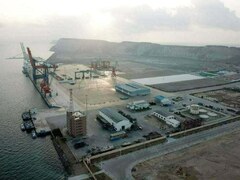Saudi Arabia’s planned purchase of Polish refining assets is set to put OPEC’s top producer in charge of two thirds of Poland’s oil supply, eroding previously dominant supplier Russia’s leverage as it grapples with regional tension.
Poland has a long history of seeking to reduce its dependence on Russian energy imports through deals with alternative suppliers and its determination has grown as relations have worsened.
In recent months, Moscow and Warsaw have clashed over the Nord Stream 2 gas pipeline that bypasses shared neighbour Ukraine, as well as a migrant crisis involving another joint neighbour Belarus.
The mood between Poland and Russia had already darkened over oil supplies early in 2021 when Poland had to cut its oil purchases from Russia because of a price row between Russia’s Rosneft and Poland’s PKN Orlen.
Last Wednesday, the Saudi state oil giant said it had agreed to buy a 30% stake in Poland’s second largest refinery and to increase oil supplies to the state’s top energy firm PKN Orlen to 200,000-337,000 barrels per day (bpd).
Gdansk oil refinery’s capacity is 210,000 bpd, second only in Poland to state’s oil refinery Plock, with about 270,000 bpd.
“We value our business relationships with both Russian partners and other suppliers of crude oil to our refineries,” PKN Orlen said in an emailed answer to Reuters questions.
It said it did not intend “to discontinue business with Russian partners”, while refusing to disclose details of its trade contracts.
In reply to an emailed request for comment, Saudi Aramco said it “cannot provide further details on the deal”.
Russia’s Energy Ministry, Russia’s pipeline monopoly Transneft and Rosneft did not reply to Reuters’ requests for comment.
Poland is one of the most significant oil consumers in Baltics and its PKN Orlen holds stakes in refineries in Lithuania and the Czech Republic, which are also buyers of Russia’s flagship Urals crude.
Provided the deal is finalised, Aramco will raise its oil supply to Poland by between three and five times and may meet between 50% and 70% of Poland’s crude oil needs, Reuters calculations found.
Medium sour Saudi crude is technically well-suited to Polish refineries configured to handle Russian Urals, which is also sour, or high in sulphur, but the logistics of shipping into the region could add to costs compared with importing Russian Baltic cargoes, Viktor Katona from independent consultancy JBC Energy told Reuters. “Poland’s aim to achieve independence from Russian supplies is primarily politically driven,” Katona said, adding any reduction in spot purchasing and in market outlets would hurt Russian oil exporters.
Already, Saudi Arabia is supplying around 90,000 bpd of seaborne crude to Poland’s Gdansk, compared with around 142,000 bpd of Russian Urals shipped via the same route, Katona said.
Poland’s seaborne imports, which also include North Sea and West African grades, have risen as volumes through the old Soviet Union Druzhba oil pipline to Poland have declined, reflecting the political and also technical problems of recent years.
This month Russia is expected to supply 120,000 bpd of oil via Druzhba compared to some 220,000 bpd in January 2021, according to two industry sources and Eikon data.
That compares with up to 500,000 bpd in the mid-2000s.
Two sources close to the Saudi deal said it mattered considerably to Poland, but was unlikely to have any bearing on internal politics within the OPEC+ group, which brings together the Organization of the Petroleum Exporting Countries (OPEC) and other big producers, notably Russia.—Reuters





















Comments
Comments are closed.